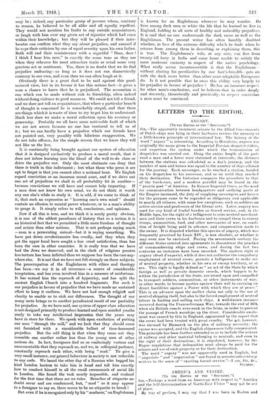LETTERS TO THE EDITOR.
ANGARY.
ITO THE EDITOR OF THE " SPECTATOR."]
SIR,—The apparently imminent seizure by the Allied Covernmenls of Dutch ships now lying in their harbours revives the memory of a little-known principle of international law. The history of the word "angary " is interesting. According to Herodotus, an9ams was originally the name given to the Imperial Persian despatch-riders. and angarium the system under which the transmission of despatches was carried out. Along the entire length of the past- road a man and a horse were stationed at intervals; the distance between the stations was calculated as a day's journey, and the number of men and horses was equal to the number of days allowed for the journey. Each messenger, as he reached a station, handed on his despatches to his successor, and so on until they reached their destination. The historian compares the procedure to that of the torch-race, and a modern parallel may be found in the " prairie post " of America. In Roman Imperial times, as the need for communication between headquarters and outlying parts of the Empire increased, the duty of supplying messengers-and horses for the purpose came to be regarded as obligatory and applicable to nearly all citizens, with some few exceptions, such as soldiers on active service and professors of the liberal arts. Later, angary was used for any kind of feudal burden or forced service, and, in the Middle Ages, for the right of a belligerent to seize neutral merchant- men and their crews in his harbours and to compel them to convey troops, ammunition, food, and other necessaries of war, on condi- tion of freight being paid in advance, and compensation made to the owner. It is disputed whether this species of angary, which was frequently practised by Louis XIV., is now obsolete, or whether it may even now be exercised. During the seventeenth century the different States entered into agreements to discontinue the practice of commandeering ships and crews, and during the last two centuries no instances have been recorded. The modern right of angary (droit d'angarie), while it does not authoriie the compulsory employment of neutral crews, permits a belligerent to make use of neutral property, whether in his own or enemy territory, or at sea. This right is legally defined as " an act of the State by which foreign as well as private domestic vessels, which happen to be within the jurisdiction of the State, are seized upon and compelled to transport soldiers, ammunition, or other instruments of war; in other words, to become parties against their will to carrying on direct hostilities against a Power with which they are at peace." This is an advance upon the earlier claim not only to the use of neutral shipping itself, but also to the forced employment of neutral labour in loading and sailing such ships. A well-known instance occurred during the Franco-German War, towards the end of 1870, when six British vessels were sunk in the Seine, in order to prevent the passage of French warships up the river. Considerable excite- ment was caused by this in England, aggravated by the report that the crews had been treated with great cruelty. The act, however, was excused by Bismarck on the plea of military necessity; the excuse was accepted, and the English shipowners fully compensated. The principle has been further extended so as to include the seizure of railway and other material belonging to neutrals, and even to the right of their destruction; it is stipulated, however, by the Hague regulations that indemnities must always be paid for the
seizure and use of such property or for their destruction. .
The word " angary " was not apparently used in English,. but " angariate " and " angariation " are found in seventeenth-century writers in the sense of " exacting forced service."—I am, Sir, &c.,


































 Previous page
Previous page